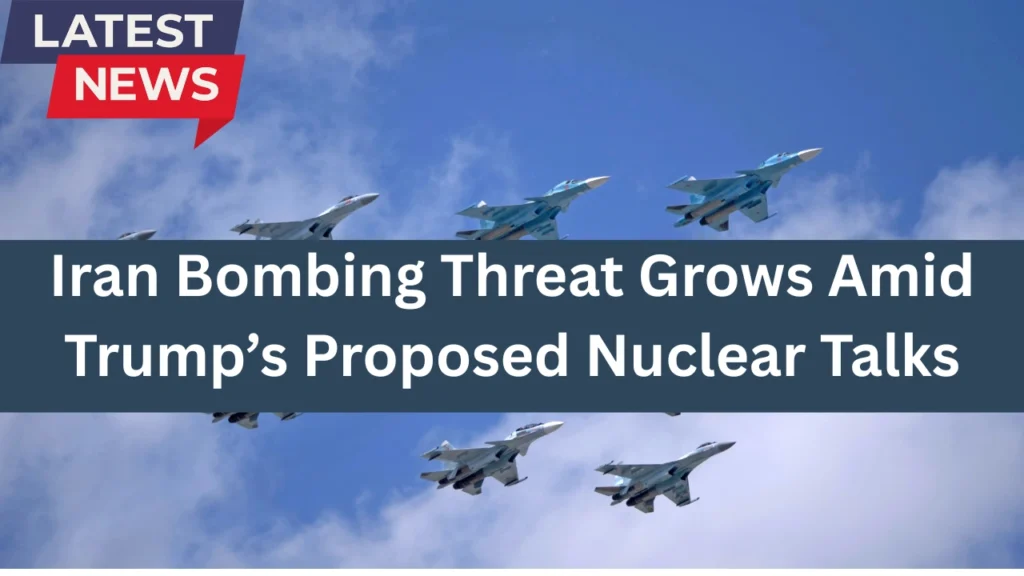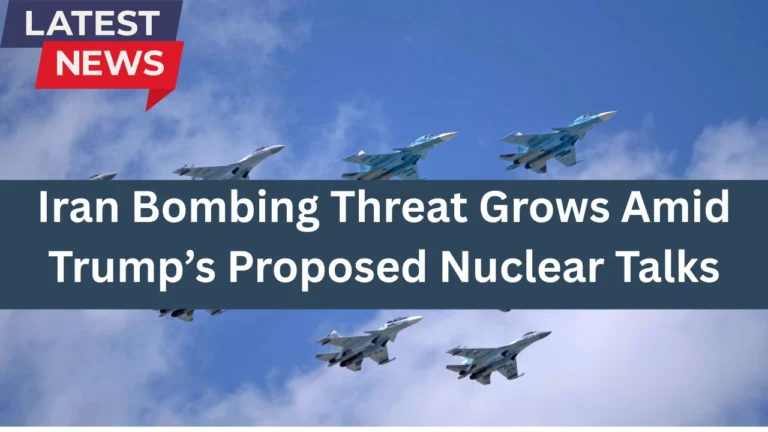As tensions escalate over Iran’s controversial nuclear program, fresh warnings have emerged about the growing possibility of military conflict if diplomatic negotiations between Tehran and Washington fail. A report from the Daily Express (UK) reveals that former U.S. President Donald Trump has threatened Iran with “great danger” should it resist efforts to engage in direct talks, suggesting that military action remains a very real option on the table.

This development follows renewed claims by Trump that a direct meeting between U.S. and Iranian officials had been scheduled to take place in Oman on Saturday a claim that was swiftly denied by Iran, which insisted that any discussions must go through intermediaries.
Trump allegedly making plans to bomb Iran after repeatedly insisting Iran is pursuing nuclear arms despite his own intelligence community saying there’s zero proof, in what looks to be an attempt to start Iraq war 2.0.
— Duopoly Destroyer (@realnikohouse) April 2, 2025
Just days ago Rubio & Gabbard called Trump the “peace”… pic.twitter.com/xRPJbRIeto
“We’re having direct talks with Iran, and they’ve started. It’ll go on Saturday,” Trump said from the Oval Office. “We have a very big meeting, and we’ll see what can happen. I think everybody agrees that doing a deal would be preferable. But Iran cannot have a nuclear weapon, and if talks aren’t successful, it will be a very bad day for Iran.”
U.S. Military Presence Grows in the Region
In what appears to be a clear message of intent, the United States has significantly ramped up its military posture in the Middle East. According to Daily Express sources:
- A second aircraft carrier strike group is en route to the region.
- B-2 Spirit stealth bombers, which are capable of carrying nuclear payloads, have been deployed to Diego Garcia, a strategic island base in the Indian Ocean located within striking distance of Iranian territory.
These moves are being interpreted by analysts as an attempt to exert pressure on Iran ahead of any formal or informal nuclear negotiations.
National Security Experts Warn of Escalation
Dr. Oz Hassan, Reader in National Security at the University of Warwick, has warned that Trump’s threats cannot be taken lightly. He emphasized the risk of military escalation if tensions continue to climb.
“The risk of military escalation is very real if talks break down,” Hassan told the Daily Express. “A small, targeted strike—perhaps on a nuclear facility—might send a message, but it wouldn’t significantly halt Iran’s nuclear ambitions.”
He added that any serious attempt to disable Iran’s nuclear program would necessitate a large-scale military operation involving:
- Stealth bombers
- Bunker-busting munitions
- Extensive airstrikes on Iranian air defenses, radar systems, and missile facilities
“This would look less like a precision strike and more like the opening of a wider war,” Dr. Hassan cautioned.
Military Pressure as a Negotiation Tactic?
Experts are divided on whether Trump is truly seeking conflict or using the threat of military action as leverage to push Iran toward a new nuclear deal.
Dr. Pierre Pahlavi, Chair of the Department of Security and International Affairs at the Canadian Forces College in Toronto, believes that targeted bombing campaigns remain a realistic possibility, even if full-scale war is unlikely.
“There is nothing preventing the U.S. from delegating this task to its Israeli allies, offering logistical or indirect support,” Dr. Pahlavi said.
He argued that such a move could be part of a strategic bargaining tactic, aimed at compelling Iran to negotiate its nuclear activities, particularly under pressure of looming military consequences.
What’s at Stake: Iran’s Nuclear Program
Iran’s nuclear program has long been a flashpoint in global geopolitics. Though Tehran maintains that its nuclear efforts are for peaceful purposes, Western nations have accused it of secretly developing the capacity to build nuclear weapons.
The 2015 Iran nuclear deal (JCPOA), brokered under the Obama administration and backed by European allies, placed limits on Iran’s nuclear enrichment in exchange for sanctions relief. However, Trump withdrew the U.S. from the deal in 2018, reimposing sanctions and plunging relations into a downward spiral.
Now, with Iran enriching uranium at levels closer to weapons-grade purity, concerns are rising once again that the nuclear threshold could soon be crossed—raising the stakes for all involved.
Diplomatic Confusion and Denials
Despite Trump’s claim of direct talks, Iranian officials have categorically denied that such negotiations are underway.
“There are no direct talks scheduled with the U.S.,” said a spokesperson from Iran’s Foreign Ministry. “Any communication, if it happens, must occur through appropriate intermediaries.”
This diplomatic back-and-forth further complicates the already delicate situation. Observers say the lack of clarity over communication channels makes miscalculation and misunderstanding more likely—and potentially more dangerous.
Rising Internal Resistance in Iran
The Daily Express also highlighted growing opposition within Iran to the ruling regime. Iranian American scholars and activists are reportedly calling for a democratic alternative to the current theocracy, emphasizing local resistance movements over foreign intervention.
While the U.S. government has not signaled support for regime change, there is a growing sentiment among segments of the Iranian diaspora that change from within is both necessary and inevitable.
“We don’t need another war,” said an Iranian American academic. “We need a strategy that supports Iranian civil society—not just threats of bombing.”
Global Reactions and Diplomatic Stakes
The international community, especially Europe and the United Nations, is closely watching the escalating rhetoric between the U.S. and Iran. Many world leaders are urging both sides to exercise restraint, warning that military confrontation would destabilize the entire Middle East.
The Gulf Cooperation Council (GCC), comprising key U.S. allies like Saudi Arabia and the UAE, remains divided—some favor a firm stance against Iran, while others fear spillover effects and economic fallout.
Conclusion: High Stakes, Uncertain Future
With tensions simmering and military assets moving into position, the threat of an Iran bombing campaign looms larger than ever. While Donald Trump’s rhetoric may be part of a calculated strategy to bring Iran back to the negotiating table, the risk of escalation is real—and potentially catastrophic.
Whether diplomacy can prevail or the world edges closer to another Middle Eastern conflict will likely depend on the coming days and weeks, as both sides weigh the cost of war against the opportunity for peace.

